Technology advances so quickly that it can be hard to keep up.
The benefit of this rapid growth is that there are always new innovations that address human needs.
While these technologies are often marketed to younger people, they can have great benefits for everyone, including seniors.
Today we’ll learn about three technologies that can support seniors’ health and wellness, and make life easier.
1. Telemedicine
Telemedicine services allow us to remotely access medical care via video and phone calls, online chat, and apps.
We can receive advice, diagnosis, referrals, prescriptions, etc. Another popular use for telemedicine is mental health care.
Telemedicine has been around for a while, but Covid-19 created a surge, with use increasing by 154%.
Older adults are the most frequent users; 43% of adults over 65 have accessed telemedicine services since 2021.
Benefits of telemedicine for seniors:
- Accessible for people with mobility limitations
- Reduces exposure for immunocompromised people
- Eliminates cost of transportation
- Easy access to specialists not available locally
- Many platforms include accessibility features, like language interpreters, closed captioning, visual aides, etc.
- Provides social contact for isolated people
2. Wearables
The global wearable technology industry is worth more than $60 billion and projected to grow.
Major companies have started creating wearable products geared towards the needs of seniors. The most popular wearables are smartwatches.
These devices cover a range of needs, like:
- Blood pressure monitoring
- Fitness tracking
- Oxygen level monitoring
- Fall detection. The device alerts an emergency contact when a fall is detected.
- GPS tracking, so the wearer can be located if lost or hurt.
- Sleep tracking
- Integration with smart home devices, like smart locks and lights. People with limited mobility can use voice control to unlock doors, control lights, etc.
3. Assistive Devices
Assistive devices are items that make life easier for seniors, and them live independently.
These include:
- Smart pill dispensers. These machines can be programmed to dispense medication according to a schedule. This helps reduce the chance of missing doses, or taking too many.
- Robot vacuums. These keep the house tidy without seniors having to move a heavy vacuum cleaner around. They also clean places that are difficult to reach.
- Smart pet feeder. Similar to the pill dispenser, this device can be programmed to feed and water pets according to a schedule.
- Smart outlets. Seniors who struggle with memory issues may leave things plugged in/turned on when they leave the house. Smart outlets allow devices to be turned off from an app, even when not at home.
- Voice-activated assistants. These popular devices allow seniors to set reminders, order things, make calls in an emergency and more.
A subcategory of assistive devices are called hearables. This refers to technology for people with hearing loss.
These include:
- Doorbells and smoke detectors with flashing lights
- Wireless headphones that connect to the TV. Seniors can turn up the volume in the headphones, while the external tv volume remains the same for other viewers.
- Hearing amplifiers. These devices enhance sound in certain situations, like during conversation. They’re made to look like modern earbuds. However, they aren’t a replacement for hearing aids and should be discussed with a healthcare professional beforehand.
We’re living through a technological renaissance.
With the rise of new products and services, seniors can access healthcare more easily, and live healthy, independent lives.
Sources:
https://www.cdc.gov/nchs/products/databriefs/db445.htm
Related Article:
Home Design for Hearing Loss: Tips for Creating a user-Friendly home
https://www.mytutor.co.uk/blog/parents/the-screen-time-diet-helping-your-teen-find-the-balance-with-tech/

